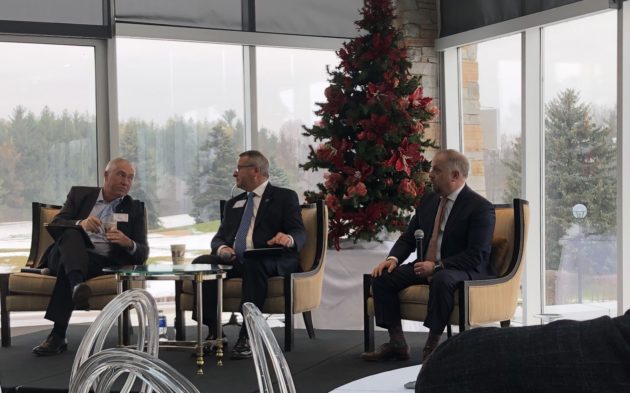TCA panel offers view from the top

BRAMPTON, Ont. – Canadian Trucking Alliance (CTA) chief Stephen Laskowski is encouraged increased regulatory scrutiny is being paid to the trucking industry, and hopes it will continue to be targeted at the bad actors.
“If we are going to change, whether it be truck safety or the image of the industry, there is no point in asking government to continue to focus on the top,” Laskowski said at the Truckload Carriers Association’s Bridging Border Barriers conference Nov. 20. “They’re motivated by their own business ethics to do that. The great opportunity is, government is now waking to the reality we do have a bottom to the industry and that is where we should focus our attention.”
Dan Einwechter, chairman and founder of Challenger Motor Freight, added “My wish list is that we can do a better job at self-regulating. I’m so worried about the honorable intentions of the misguided at the regulatory level, that they mean well but influence our lives and pass regulations that can dramatically affect us in a negative way.”
He added, “I’d rather we have the threat of government intervention, rather than government intervention.”
However, a regulation both Einwechter and Laskowski can get behind, is the requirement for carriers to use electronic logging devices (ELDs). Einwechter recently made a run to Kentucky and was impressed by how simple the ELD was to operate – even for an old-time trucker.
“It was wonderful,” Einwechter said of the ELD. “I think it takes a lot of pressure off the driver.”
John Lyboldt, TCA president, praised Canada for its more sensible approach to legislating ELDs.
“The way Canada is doing it is a much better process (than the U.S.),” he said, citing the requirement for devices to be certified by a third party. “If there’s any way you can cut through the delays in Canada, and get moving with it, we’re all going to be better off.”
Laskowski said the Canadian industry wishes it rolled out its own legislation at the same time as in the U.S., but that we learned from mistakes made south of the border.
“The upside benefit of it is, you get to learn,” he said of the delays.
ELDs have also given carriers tools to track detention time, and to make shippers and receivers more accountable. Laskowski said he looked at the food industry to explore this issue, and learned shippers and receivers were starting the clock when loading or unloading began – even if the truck was waiting for 10 hours prior. With an ELD, “Your detention time becomes their detention time, because when you run out of hours-of-service, they run out of hours-of-service,” he said. “I think detention time, with ELDs, will be addressed because the supply chain will have to manage it if they’re going to maintain efficiencies.”
Asked how carriers were faring this year after a phenomenal 2018, Lyboldt said conditions for carriers are “rapidly deteriorating” to beyond 2017 levels, and he urged all carriers to focus on what they’re doing within their own four walls to weather the downturn.
“The comparative year is 2018, and that was a pretty good year for almost everybody,” added Einwechter. “In relative terms, 2019 is not as robust and not as great, but it’s still a decent year. We are moderating our growth.”
Einwechter said he didn’t buy into the idea last year that he needed to lock in orders for new trucks or trailers or be unable to secure build slots. “I told them to get lost,” he said. “We’ll get trucks when we need them.”
He thinks truck and trailer OEMs, and trucking companies themselves, should be more disciplined and not chase a hot market.
Asked what they’d like to see done to improve U.S./Canada relations, Laskowski said there’s room for improvement at border crossings. Lyboldt agreed that technology is underutilized and could better be used to expedite border crossings. Einwechter would like to see less redundancy at the border, and shared Customs facilities.
Ask if the driver shortage is real or a myth, all agreed there’s a shortage of “quality” drivers. This has led Challenger to launch its own training academy. The average applicant in 1989, Einwechter said, was basically ready to go on the road. Now they require in-depth training upon hiring.
“We have an obligation to train,” he said. “It has been a travesty to see some of the drivers who have come through our door with a year’s verifiable experience, hop in the truck with the driver-trainer and they’re scared before they get to the traffic light leaving our facility.”
Lyboldt raised concerns about the legalization of marijuana in Canada and some states. Laskowski said the CTA’s position is “zero-tolerance.” That’s the policy at Challenger, as well. The CTA also wants to see mandatory drug and alcohol testing be required in Canada.
Have your say
This is a moderated forum. Comments will no longer be published unless they are accompanied by a first and last name and a verifiable email address. (Today's Trucking will not publish or share the email address.) Profane language and content deemed to be libelous, racist, or threatening in nature will not be published under any circumstances.